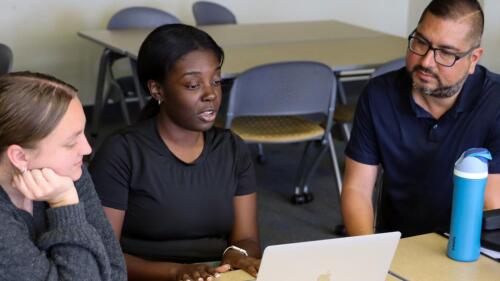Athletes at all levels—whether competing in youth leagues, collegiate sports, or professional arenas—face immense pressure to perform. The relentless pursuit of success, coupled with the physical and mental demands of their sport, can often lead to anxiety and burnout, impacting both their performance and well-being. Understanding and managing these challenges is crucial for athletes to maintain a healthy balance between their passion for the game and their overall mental health.
The 100% online Bachelor of Science in Sport, Exercise, and Performance Psychology at Kent State University prepares aspiring coaches, trainers, and practitioners to recognize and address these challenges using proven psychological strategies. This program equips students with the skills to help athletes overcome mental barriers and achieve long-term success—both on and off the field.
Understanding Athlete Anxiety and Burnout
Athletes often experience unique psychological stressors that can lead to feelings of anxiety and burnout. Some of the most common mental health challenges they face include:
1. Performance Anxiety
Many athletes struggle with the pressure to perform at their best during competitions. This anxiety can manifest as:
- Fear of failure or disappointing others.
- Difficulty concentrating under pressure.
- Physical symptoms such as rapid heartbeat, sweating, or nausea.
2. Burnout from Overtraining
Burnout occurs when an athlete experiences physical and emotional exhaustion due to prolonged periods of training, competition, and high expectations. Symptoms of burnout may include:
- Loss of motivation and enjoyment in the sport.
- Chronic fatigue and reduced performance levels.
- Increased irritability and mood swings.
3. Injury-Related Stress
Coping with injuries can lead to significant mental challenges, including:
- Fear of re-injury and reluctance to return to play.
- Frustration with the recovery process.
- Feelings of isolation from teammates and coaches.
4. Balancing Life and Sport
Student-athletes, in particular, face unique challenges in balancing academic responsibilities, social life, and athletic commitments, leading to:
- Time management struggles.
- Sleep disturbances and exhaustion.
- Feelings of being overwhelmed and mentally drained.
How Sport Psychology Helps Athletes Overcome Anxiety and Burnout
Sport psychology offers evidence-based strategies that help athletes manage stress, stay motivated, and sustain their performance while maintaining mental well-being. The B.S. in Sport, Exercise, and Performance Psychology at Kent State University provides students with the tools to support athletes in overcoming these challenges. Some of the key psychological strategies include:
1. Mental Skills Training
Teaching athletes how to enhance their mental resilience can improve focus and confidence during high-pressure situations. Common techniques include:
- Visualization and Imagery: Helping athletes mentally rehearse their performance to build confidence and reduce anxiety.
- Goal Setting: Encouraging athletes to set realistic, achievable goals to stay motivated and focused.
- Mindfulness and Relaxation Techniques: Utilizing breathing exercises and meditation to stay present and reduce stress.
2. Stress Management Strategies
Athletes are taught how to manage stress through:
- Cognitive Behavioral Techniques: Identifying and changing negative thought patterns that contribute to anxiety.
- Positive Self-Talk: Encouraging constructive internal dialogue to build confidence and resilience.
- Time Management Skills: Helping athletes effectively balance training, competition, and personal life.
3. Coping with Injury and Recovery
Psychological support is essential for athletes dealing with injuries. Sport psychologists help by:
- Providing emotional support and counseling to address feelings of frustration or isolation.
- Developing gradual reintegration plans to help athletes regain confidence after injury.
- Encouraging patience and a growth mindset during the rehabilitation process.
4. Preventing Burnout through Self-Care
Athletes can prevent burnout by incorporating self-care strategies into their routines, such as:
- Encouraging proper rest and recovery, including adequate sleep and nutrition.
- Fostering a healthy work-life balance to ensure enjoyment outside of sport.
- Incorporating cross-training and variety in their routines to maintain motivation.
5. Building Support Systems
Athletes thrive in environments where they feel supported by coaches, teammates, and mental health professionals. Sport psychology emphasizes:
- Strong coach-athlete relationships based on trust and open communication.
- Peer support networks to help athletes share their challenges and experiences.
- Collaboration with families to provide additional emotional support.
How Kent State’s Online B.S. in Sport, Exercise, and Performance Psychology Prepares Future Coaches and Practitioners
Kent State’s 100% online program gives students a deep understanding of psychological principles that can be applied directly to athletic and performance settings. The curriculum covers topics such as:
- Psychology of Motivation and Performance: Understanding how to inspire and sustain peak performance in athletes.
- Exercise Psychology and Adherence: Learning how to encourage healthy habits and lifelong fitness engagement.
- Mental Skills Training: Developing practical tools to support athletes in achieving their goals.
- Group Dynamics in Sport: Exploring the role of team cohesion and leadership in performance success.
Career Opportunities for Graduates Include:
- Sports Coach or Athletic Trainer: Using psychological techniques to help athletes manage pressure and optimize performance.
- Performance Consultant: Working with professional athletes, musicians, and business professionals to develop mental toughness.
- Health and Wellness Coach: Assisting individuals in building sustainable, mentally healthy exercise habits.
- Rehabilitation Specialist: Supporting injured athletes through psychological coping strategies and recovery plans.
Why Choose Kent State’s Online Program?
Kent State’s Bachelor of Science in Sport, Exercise, and Performance Psychology offers a unique advantage by combining flexibility, affordability, and real-world applicability. The online format allows students to:
- Learn from anywhere while balancing personal and professional commitments.
- Gain hands-on experience through applied coursework and practical exercises.
- Develop expertise in a growing field with a curriculum designed to meet the evolving needs of athletes and performers.
Take the Next Step in Supporting Athletes’ Mental Well-Being
If you’re passionate about helping athletes overcome mental barriers and achieve their full potential, the Bachelor of Science in Sport, Exercise, and Performance Psychology at Kent State University is the perfect next step.
Equip yourself with the knowledge and skills to make a difference—start your journey today!








